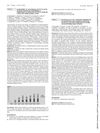Low Disease Activity—Irrespective of Serologic Status at Baseline—Associated with Reduction of Corticosteroid Dose and Number of Flares in Patients with Systemic Lupus Erythematosus Treated with Belimumab: A Real-Life Observational Study
February 2018
in “
Seminars in Arthritis and Rheumatism
”
TLDR Belimumab reduces disease activity, steroid use, and flares in lupus patients.
This multicentre prospective observational study included 91 systemic lupus erythematosus (SLE) patients treated with belimumab for at least 3 months. The study found that belimumab significantly reduced disease activity, corticosteroid dosage, and the number of flares, irrespective of the patients' serologic status at baseline. Over 40% of patients achieved a low disease activity state (LLDAS) within 9-12 months, and more than 20% discontinued corticosteroids. The number of flares and severe flares decreased by 62% and 50%, respectively, during the first 12 months. Twenty patients discontinued treatment due to inadequate response, and two due to potential side effects.
